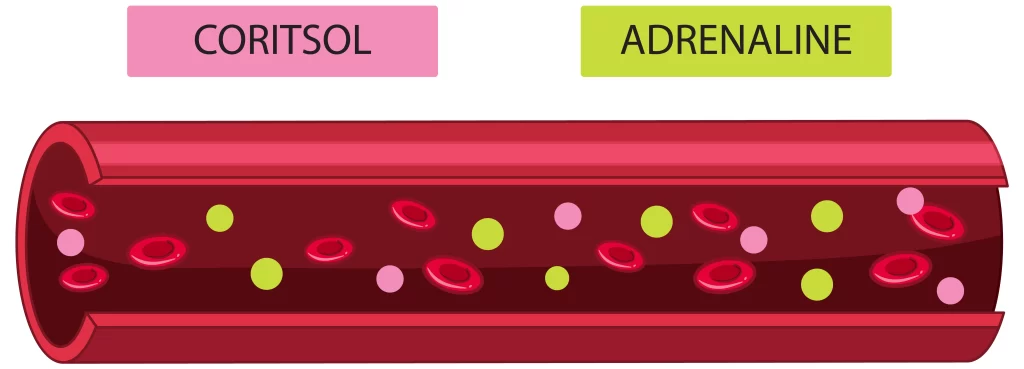The Cortisol Belly: Understanding the Impact of Stress on Your Body
Are you struggling to get rid of unwanted belly fat, despite your best efforts? It’s possible that the culprit behind your troubles is cortisol, a hormone that plays a crucial role in our stress response. In this article, we’ll take a closer look at cortisol belly and how it affects your body.
What is Cortisol?
Cortisol is a hormone produced by the adrenal glands in response to stress. It’s often referred to as the “stress hormone” since it prepares your body for a fight or flight response in dangerous situations. Cortisol plays an important role in regulating blood sugar levels and metabolism, but high levels of cortisol over time can lead to health issues such as weight gain, decreased energy expenditure, and sleep disturbances.
| Key Takeaways |
| Cortisol is a hormone produced in response to stress, and elevated cortisol levels can contribute to the accumulation of belly fat. |
| High cortisol levels increase insulin resistance, leading to easier conversion of calories into fat cells and storage in the abdominal area. |
| Cortisol belly is characterized by symptoms such as abdominal bloating, weight gain around the midsection, difficulty losing weight, and sleep disturbances. |
| Chronic stress, sleep deprivation, and poor diet are common causes of high cortisol levels. |
| To reduce cortisol belly, it is crucial to manage stress effectively through techniques like meditation, deep breathing exercises, and yoga. |
| Strength training exercises that target the abdominal muscles can help tone and tighten the midsection, while regular physical activity promotes muscle building and increased metabolic rate. |
| A healthy diet rich in fiber, lean proteins, and healthy fats, while avoiding processed foods high in sugar, can help regulate cortisol levels. |
| Adequate sleep and seeking professional help for emotional eating or sleep disturbances are important in reducing cortisol belly. |
| Managing cortisol belly is achievable by adopting a comprehensive approach that includes stress management, exercise, and a healthy lifestyle. |
How Cortisol Affects Belly Fat
Cortisol affects the accumulation of belly fat both directly and indirectly. When cortisol levels are elevated for prolonged periods, it can cause resistance exercises to be less effective while causing increased stress-related overeating which leads to more belly fat.
High levels of cortisol also increase insulin resistance which makes it easier for calories from food to be converted into fat cells. In addition, cortisol causes decreased muscle building which decreases energy expenditure while increasing fat storage.
Belly fat is divided into two categories: subcutaneous and visceral fats. Subcutaneous fat is found right under the skin and can be easily pinched whereas Visceral fats are found within the abdominal cavity surrounding internal organs like the liver etc. High levels of cortisol contribute towards visceral fat accumulation which increases inflammation markers leading eventually to chronic inflammation with time.

Symptoms of Cortisol Belly
Some symptoms associated with high cortisol levels include abdominal bloating, weight gain around the midsection, difficulty losing weight, and sleep disturbances. In addition, chronic stress can cause inflammation in the body resulting in symptoms of an unhealthy body such as aches and pains, decreased immunity, and fatigue. If you’re experiencing any of these symptoms, it might be time to take control of your cortisol levels and reduce that stubborn belly fat for good.
Causes of High Cortisol Levels
The most common causes of high cortisol levels are chronic stress, sleep deprivation, and poor diet. Stress causes your body to release cortisol which leads to increased insulin resistance and unwanted belly fat. Lack of sleep also increases cortisol levels making it more difficult to lose weight.
Dietary control is crucial for managing cortisol levels – opting for rational food choices such as protein-rich foods like meat or vegetables instead of calorie-dense foods like carbs or sugars may help manage cortisol spikes throughout the day. If you’re trying to lose weight but struggling with belly fat despite exercise and dietary changes, consider monitoring your cortisol levels along with taking steps towards reducing chronic stress in your life.
What is Cortisol?
Definition and Function of Cortisol In the Body
Cortisol is a hormone produced by the adrenal gland. It plays an important role in regulating metabolism, immune response, and stress levels in the body. When released, cortisol helps the body to manage stress by increasing blood sugar levels, suppressing the immune system response, and increasing heart rate.
The release of cortisol also affects appetite, as chronic elevation of cortisol may lead to stress-related overeating. Cortisol can also slow down digestion due to its effect on metabolism which can cause abdominal discomforts such as bloating.
How It Affects Stress Levels and Metabolism
Cortisol is often referred to as the “stress hormone” because it is released during times of physical or emotional stress. Elevated cortisol levels can lead to negative effects such as increased anxiety and poor self-image that further compound the issue at hand.
Chronic inflammation caused by high-stress levels can lead to conditions like inflammatory diseases. As a result, managing one’s cortisol levels becomes important in reducing inflammation throughout the body.
Elevated cortisol levels may also lead to excess calorie intake which results in unwanted belly fat accumulation. Moreover, it reduces calorie burn leading to an increased likelihood of weight gain over time.
Reducing cortisol levels through rational food choices like avoiding sugar and caffeine while eating healthy foods rich in fiber and protein- could aid in reducing belly fat accumulation or metabolic rates while managing inflammatory diseases such as arthritis. Regular exercise such as strength training with weights (resistance exercises) helps build muscle mass that may boost overall health by enhancing one’s natural immunity against stressors within their environment, thus resulting in a less stressful life experience.
How Cortisol Affects Fat
The Not-So-Sweet Relationship Between Cortisol and Belly Fat
Cortisol, commonly known as the “stress hormone,” is produced by the body’s adrenal glands. It plays a crucial role in our stress response system and helps regulate our metabolism.
However, when cortisol levels remain elevated for extended periods, it can lead to unwanted belly fat accumulation. Cortisol production is triggered primarily by stress causes, such as high-stress life events or chronic stress.
When cortisol levels are elevated, it increases insulin resistance and reduces calorie burn. The result: excess calories are stored as fat in the body, particularly in the abdominal area.
Visceral Fat vs. Subcutaneous Fat
Not all fat is created equal. Visceral fat and subcutaneous fat refer to specific types of adipose tissue in the body. Visceral fat is located deep within the abdominal cavity and surrounds vital organs such as the liver and pancreas. This type of fat poses a higher risk for health issues like heart disease and diabetes due to its inflammatory properties. Subcutaneous fat lies beneath the skin but above muscles and bones throughout various parts of the body. This type of adipose tissue acts as insulation for temperature regulation but can also contribute to an individual’s overall body composition. Elevated cortisol levels have been linked with visceral fat accumulation specifically. This means that managing cortisol levels should be a priority when reducing belly fat which poses a potential risk to one’s health.
The Emotional Connection Between Stress Hormone Imbalance And Belly Fat
Stress-related overeating is often a factor when it comes to unwanted belly fat accumulation caused by high cortisol levels. Elevated cortisol can trigger uncontrollable eating habits due to emotional distress or poor sleep quality caused by chronic stress. Additionally, high-stress life events can lead to sleep disturbances, which can impact cortisol production and reduce the body’s ability to recover from the daily grind.
This chronic stress can also lead to inflammation markers and a weakened immune response, further contributing to unwanted belly fat. When you’re under stress, it can be challenging to make rational food choices.
However, making healthy food decisions is crucial when reducing cortisol levels and shedding excess belly fat. Strength training and weightlifting are also excellent ways to target abdominal muscles while reducing overall body fat percentage.

Physical Signs that Indicate Cortisol Belly
Cortisol belly is a condition that can be characterized by various physical signs. One of the most obvious is the accumulation of fat in the abdominal area, which can result in a bulging belly.
This fat can be either subcutaneous or visceral, with visceral being more dangerous as it is linked to an increased risk of heart disease, diabetes, and other health problems. Another physical sign of cortisol belly is an increase in waist circumference.
The ideal waist measurement for men should not exceed 40 inches while for women, it should not exceed 35 inches. Any measurements beyond these numbers indicate that an individual may have excess fat around their midsection, which may be caused by a cortisol belly.
In addition to this, cortisol belly can also cause changes in skin texture and quality. People suffering from high cortisol levels may develop stretch marks on their abdomen as well as thinning skin.
Emotional Symptoms Associated with High Cortisol Levels
Cortisol not only affects our body physically but also has significant emotional effects on us. Individuals suffering from high cortisol levels may experience stress-related overeating and binge eating which leads to unwanted belly fat accumulation. This condition can also cause sleep disturbances like insomnia or disrupted sleep patterns resulting in chronic fatigue.
Sleep disturbance causes hormonal imbalances leading to high cortisol levels which further exacerbate the problem. People with high cortisol levels may feel overwhelmed and anxious due to chronic stress.
They tend to lose control over food intake and make irrational dietary choices resulting in excess calories and unwanted weight gain. Anxiety and depression are closely linked with high cortisol levels due to the effect of corticotrophin-releasing hormone (CRH) on mood regulation causing emotional turmoil.
Taking Control Of Your Cortisol Belly
Cortisol belly is a condition that affects many individuals due to the stressful and fast-paced lifestyle of modern society. However, it is possible to regain control over your body by adopting healthy food decisions, dietary control, and exercising regularly.
Strength training and muscle-building exercise can help you lose excess fat around your belly while also reducing inflammation markers by improving hormonal balance. A healthy diet consisting of fibrous vegetables, lean protein sources, and healthy fats promotes weight loss, reduces chronic inflammation, and helps regulate cortisol levels.
Stress-controlling techniques such as meditation, deep breathing exercises, or yoga can help lower cortisol levels. It is essential to create a daily routine that involves relaxation techniques to reduce stress levels and keep cortisol under control.
Cortisol belly can be a challenging condition but with proper care, it is possible to regain control of one’s body. A combination of strength training exercises, healthy food choices, and stress reduction techniques may help you achieve your goal of losing unwanted belly fat while leading a healthier life.
Causes of High Cortisol Levels
The High-Stress Life
Stress can be a silent killer and the biggest contributor to high cortisol levels. When we are constantly exposed to stress, whether it is at work or in our personal lives, our body releases cortisol.
The problem with high cortisol levels is that it can cause uncontrollable eating and disrupt normal hormonal balance in the body. Unfortunately, high-stress life is often unavoidable but controlling techniques such as meditation or practicing mindfulness can help reduce stress levels.
Furthermore, if you find yourself struggling with belly fat and the hormonal effects of high cortisol levels, then strength training may be a good option for you. Weightlifting has been proven to reduce overall cortisol levels and promote weight loss in the abdominal area.
The Importance of Sleep
Sleep plays an important role in hormone regulation and lack thereof can cause a number of negative health effects including unwanted belly fat. Insomnia or disrupted sleep patterns can increase cortisol production which reduces calorie burn leading to excess calories being stored as belly fat.
To combat this problem, focus on maintaining a consistent sleep schedule by going to bed at the same time every night and waking up at the same time every morning even on weekends. Additionally, incorporating calming bedtime routines such as taking a warm bath before bedtime or reading a book allows for better sleep resulting in reduced cortisol production.
Poor Diet Choices
The food choices we make play a significant role in determining our overall health status including belly fat storage. Poor diet choices often lead to unhealthy body weight gain which can negatively affect hormone regulation leading to increased cortisol production. To avoid this problem ensure rational food choices by consuming healthy foods that promote optimal health such as vegetables and fruits while limiting the intake of processed foods that contain high sugar content resulting in increased insulin resistance leading to unwanted belly fat.
Inactivity
Lack of physical activity is a significant contributor to high cortisol levels. The body relies on physical movement to reduce cortisol production and promote hormonal balance. Sedentary lifestyles lead to reduced calorie burn which can cause excess calories to be stored as belly fat.
To reduce the negative effects of inactivity, incorporate regular exercise routines such as strength training or cardio activities. Aim for at least 30 minutes of physical activity per day which will help reduce cortisol levels and promote weight loss in the abdominal area.
Ways to Reduce Cortisol Belly
Stress Management Techniques
Stress is one of the main contributing factors to cortisol belly. Therefore, one of the most important steps in reducing cortisol belly is learning how to manage stress effectively. Mindfulness meditation and deep breathing exercises are great tools for managing stress, as they help you stay present and calm in the moment.
Yoga and tai chi are also excellent forms of exercise that can help reduce stress levels while building muscle at the same time. Another effective method for managing stress is through cognitive-behavioral therapy (CBT).
CBT is a type of therapy that helps individuals identify negative thought patterns and replace them with positive ones. This can be especially helpful for those who struggle with poor self-image or stress-related overeating.
Exercise Routines That Target Belly Fat
Exercise is another important component in reducing cortisol belly. Cardiovascular exercise, such as running or cycling, can help reduce overall body fat, but it doesn’t necessarily target belly fat specifically.
However, strength training exercises that focus on building core muscles can help tone and tighten the abdominal area. Exercises like planks and crunches are great for targeting the abdominal muscles, while squats and lunges can help build leg muscles as well as work your core.
Remember to take breaks during workouts so you don’t become too exhausted. Overtraining can actually increase cortisol production rather than decrease it.
Foods That Help Reduce Cortisol Levels
Believe it or not, certain foods can actually help reduce cortisol levels in the body. Foods rich in omega-3 fatty acids such as salmon or nuts have been shown to lower inflammation markers associated with high cortisol levels. Eating a balanced diet with whole foods including fruits vegetables lean proteins will result in rational food choices which promote healthy gut bacteria which affects overall immune response.
Eating foods like dark chocolate has been shown to improve mood by increasing serotonin levels. Additionally, avoiding caffeine and alcohol can help reduce cortisol production while getting enough sleep will ensure that you are not experiencing sleep disturbances or insomnia.
Take Control and Regain Your Healthy Body
Reducing cortisol belly is not an easy process but you can do it with the right tools. By managing stress levels through meditation, therapy, or exercise, focusing on building core muscles through strength training exercises, making rational food choices that reduce inflammation markers, and lowering caffeine/alcohol intake while improving sleep habits; it’s possible to take control of your body and regain a healthy physique.
Don’t let chronic stress and elevated cortisol levels steal your health from you. With patience and persistence, anyone can achieve a healthy body and mind!

Final Thoughts: Say Goodbye to Cortisol Belly
Cortisol belly is a common problem in today’s high-stress world, but it’s not impossible to manage. By understanding the causes and symptoms of elevated cortisol levels, you can start making healthy food decisions and lifestyle changes that will help you regain control over your body. The first step to managing cortisol belly is stress management.
Simple practices like mindfulness meditation and exercise can significantly reduce stress-related overeating and lower cortisol levels. Regular physical activity can also help with muscle building and increasing metabolic rate.
Next, pay attention to your diet. It’s important to eat foods that promote hormonal balance and control inflammation in the body.
Incorporate healthy fats, lean proteins, fiber-rich fruits, and vegetables into your meals. Avoid processed foods that contain high levels of sugar or refined carbohydrates.
It’s crucial to get enough sleep every night as well since insomnia can contribute to elevated cortisol levels. Aim for 7-9 hours of sleep per night and try establishing a regular sleep routine.
If you’re struggling with uncontrollable eating or binge eating due to stress, seek professional help through therapy or counseling. There’s no shame in asking for support when dealing with symptoms of an unhealthy body.
Managing cortisol belly requires dietary control, exercise routines that target belly fat, stress management techniques such as mindful eating, and medical support if needed for underlying problems like insomnia or uncontrollable eating patterns. With these tips in mind, you can start making positive decisions toward reducing unwanted belly fat caused by elevated cortisol levels while feeling confident about your body image once more!
Frequently Asked Questions
Q: What is cortisol?
A: Cortisol is a hormone produced by the adrenal glands in response to stress. It helps regulate blood sugar levels and metabolism.
Q: How does cortisol affect belly fat?
A: Elevated cortisol levels can contribute to the accumulation of belly fat by increasing insulin resistance and promoting fat storage while decreasing muscle building and energy expenditure.
Q: What are the symptoms of cortisol belly?
A: Symptoms of cortisol belly include abdominal bloating, weight gain around the midsection, difficulty losing weight, sleep disturbances, aches and pains, decreased immunity, and fatigue.
Q: What causes high cortisol levels?
A: High cortisol levels can be caused by chronic stress, sleep deprivation, and poor diet choices.
Q: How can I reduce cortisol belly?
A: To reduce cortisol belly, it is important to manage stress effectively through techniques such as meditation, deep breathing exercises, and yoga. Engaging in strength training exercises that target the abdominal muscles can also help. Additionally, adopting a healthy diet rich in fiber, lean proteins, and healthy fats while avoiding processed foods high in sugar can contribute to reducing cortisol belly. Getting enough sleep and seeking professional help for emotional eating or sleep disturbances can also be beneficial.
Q: Can exercise help reduce cortisol belly?
A: Yes, exercise can help reduce cortisol belly. Strength training exercises that focus on the core muscles can help tone and tighten the abdominal area. Regular physical activity can also contribute to muscle building and increased metabolic rate, which can aid in reducing cortisol belly.
Q: What foods can help reduce cortisol levels?
A: Foods rich in omega-3 fatty acids, such as salmon and nuts, have been shown to lower inflammation markers associated with high cortisol levels. Eating a balanced diet with whole foods, including fruits, vegetables, and lean proteins, can also promote hormonal balance and reduce cortisol levels.
Q: How important is stress management in reducing cortisol belly?
A: Stress management is crucial in reducing cortisol belly. Techniques such as mindfulness meditation, deep breathing exercises, and yoga can help lower stress levels and consequently reduce cortisol production.












